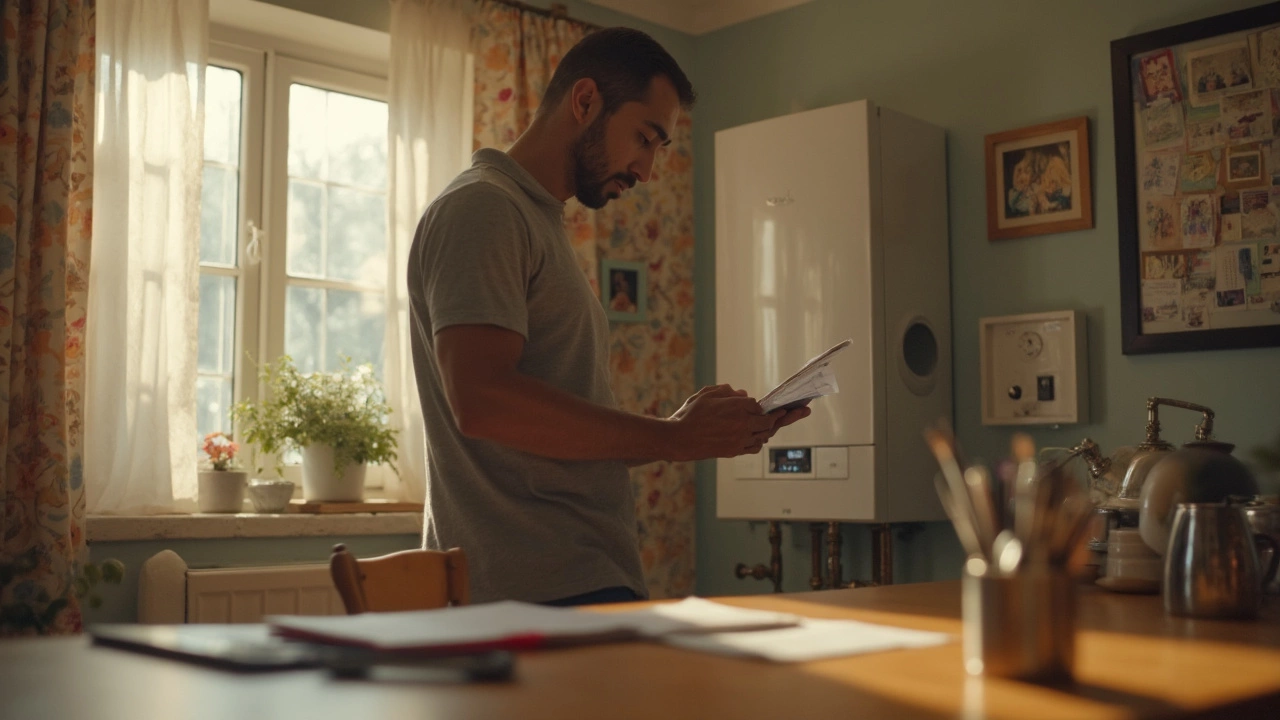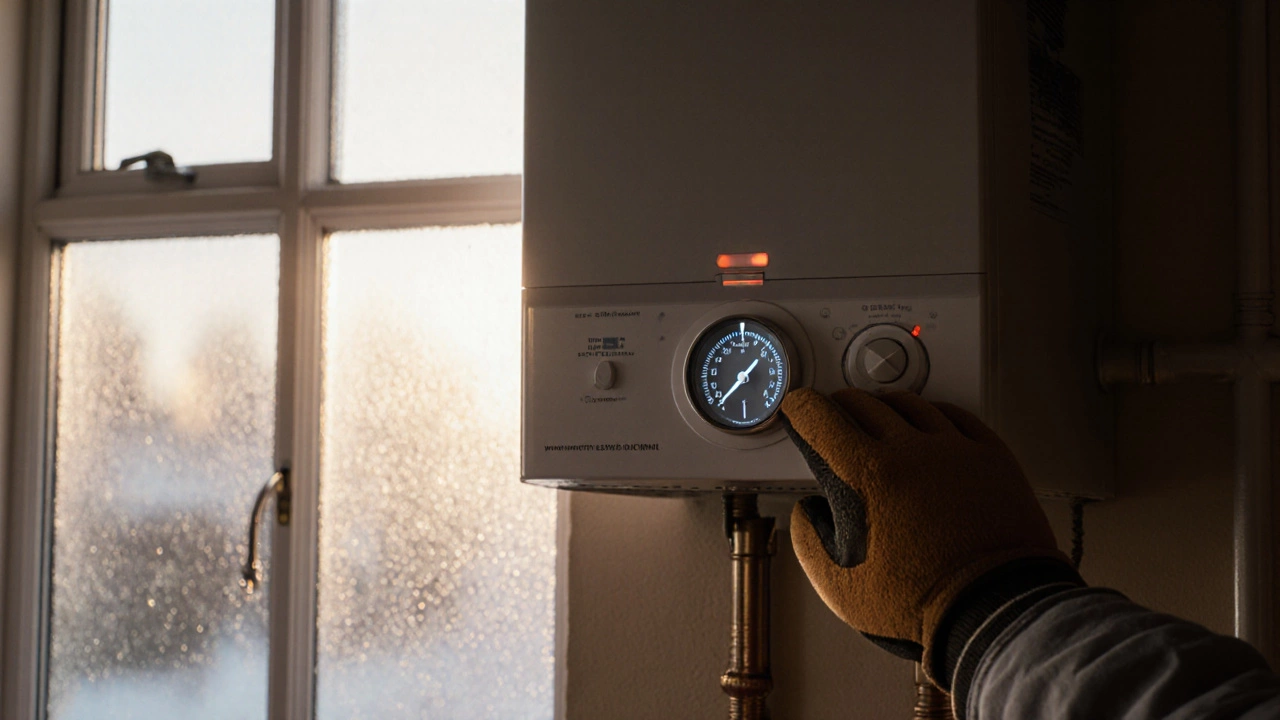
- 23 Apr 2025
- Gideon Thornton
- 0
If you think boiler maintenance sounds boring, here's a fact: a neglected boiler is the fastest way to get a cold shower on the coldest day of the year. Most of the nasty breakdowns I see come from tiny problems nobody spotted—like a drop in pressure or a weird noise people ignored until their heating quit altogether. Skipping regular checks doesn’t just risk your comfort, it can drain your wallet fast.
The thing is, you don’t need to be a heating engineer to keep your boiler in good shape. Just understanding a few basics can keep your bills in check and help you catch issues before they get big. Regular boiler care isn’t about stripping it down and rebuilding it every year. It’s about quick visual checks, knowing what sounds right and what doesn’t, and acting early.
Let’s get straight into the practical stuff—what you can and should look out for, how to spot trouble, and the steps that actually matter for keeping your boiler running safely and smoothly.
- Why Even Bother With Boiler Maintenance?
- Everyday Checks You Can Do Yourself
- Signs Your Boiler Is Crying for Help
- What the Professionals Do (And Why It Matters)
- Saving Money Without Risking Your Safety
- Danger Zones: What Not to Attempt Alone
Why Even Bother With Boiler Maintenance?
Skipping boiler maintenance might seem harmless—until your hot water quits halfway through a shower or your heating bill suddenly shoots up. The truth is, boilers aren’t “set it and forget it” machines. They’re packed with parts that wear out, get dirty, or just plain stop working over time. Looking after your boiler means you avoid those surprise breakdowns and save real money in the long run.
Most manufacturers actually require yearly boiler service to keep your warranty valid. If you can’t prove you maintained it, you might end up footing the bill for costly repairs or a replacement yourself. And yes, it’s true—regular check-ups can keep your heating running 10-15% more efficiently, according to the Energy Saving Trust in the UK. More efficiency means cheaper heating, which everyone wants right now.
Let’s talk safety. Boilers burn gas, oil, or electricity to give you heat. Problems like gas leaks or faulty valves are rare, but when they do happen, they’re serious. Routine checks usually catch issues before they get dangerous. You’ll also avoid problems like carbon monoxide leaks—trust me, that’s nothing to mess with.
If you’re the type who thinks, “If it ain’t broke, don’t fix it,” have a look at this:
| Task | How Often | Impact on Boiler |
|---|---|---|
| Annual service by a pro | Every 12 months | Prevents major faults, keeps warranty |
| Pressure check | Monthly | Spots leaks early, protects parts |
| Bleed radiators | Start of cold season | Boosts efficiency, stays warm |
So, whether you want to avoid freezing mornings, sky-high repairs, or safety scares, giving your boiler some basic attention is the smart move. A little care now can mean years more life out of your system and a much comfier home.
Everyday Checks You Can Do Yourself
Getting into the habit of checking your boiler maintenance needs doesn’t take much time, but it can help you catch problems before they cause real drama. Here’s what’s actually useful to do—even if you’re no expert.
1. Check the Pressure
The pressure gauge should usually sit between 1 and 2 bar when your heating’s off. If it drops below that, your radiators won’t get hot. If it’s above 2.5, you might have a leak or an issue with the pressure relief valve. Most modern boilers have a clear display or dial.
2. Listen for New Noises
Clunks, bangs, or gurgling? That’s not normal. A healthy boiler is pretty quiet. Loud noises can mean trapped air, limescale build-up, or a dodgy pump.
3. Check for Leaks
Never ignore a drip, puddle, or rust mark under or around your boiler. Small leaks can turn into expensive repairs or water damage.
4. Bleed Your Radiators
If some rooms don’t warm up even with the heating on, try bleeding your radiators. Just use a radiator key—the air will hiss out and hot water will flow better. Always put a cloth underneath to catch any drips.
5. Look at the Pilot Light or Display
If your boiler’s got a pilot light, it should be blue (not yellow or orange). Some new boilers have error codes on a display. If a code pops up, check the manual—it’ll tell you what’s wrong.
6. Clear the Area
Don’t block your boiler with coats, boxes, or clutter. It needs air to work safely and efficiently. Ventilation is one thing folks often forget.
- Keep the pressure in the sweet spot (1-2 bar).
- Fix odd noises fast.
- Tackle any leaks.
- Bleed radiators at least once every winter.
- Check displays or pilot lights for warning signs.
- Keep the boiler area free from stuff.
Here’s a quick look at what most boiler problems look like when first caught at home:
| Problem | First Sign | DIY Fix? |
|---|---|---|
| Low pressure | Radiators cold, gauge under 1 bar | Yes—top up carefully |
| Strange noises | New clanging or hissing | Sometimes—bleed radiators |
| Leaks | Water under the boiler | No—call a pro |
| Pilot light out | No flame or yellow/orange flame | Sometimes—try relighting, but only if safe |
Tackling these bits often makes a big difference for your boiler repair bill. Keep an eye (and ear) out, and you’re miles ahead of the game.
Signs Your Boiler Is Crying for Help
Most people miss the early warnings from their boiler because they don't know what to look for. Here are the dead giveaways it’s time to take action before you end up with a full-blown breakdown.
- Unusual noises: If your boiler starts making banging, whistling, or gurgling sounds, that’s not normal. Banging can point to blocked pipes or a build-up of limescale (sometimes called “kettling” because it sounds like a kettle about to boil).
- Strange smells: Unlike many home gadgets, a boiler should never smell odd. If you notice a faint eggy smell (think sulphur), switch off the gas and call for help—could be a leak. Carbon monoxide itself has no smell, but if your boiler is burning badly or the pilot light goes yellow instead of blue, get professional help right away.
- Dropping pressure: Boiler pressure dropping below 1 bar? That’s a classic sign of leaks or a worn-out seal. Without the right pressure, your heating won’t work as it should.
- Cold radiators: If some radiators stay cold while others are hot, or you notice uneven heating, there may be sludge clogging the system. This cuts your heating efficiency and could damage your unit long-term.
- Frequent resets: If you’re hitting that reset button more than you’re using your kettle, something’s up. Constant resets often mean a sensor or safety feature is getting tripped.
- Leaking or visible water: Any sign of dripping or pooling water around your boiler is a red flag—don’t ignore it. Small leaks can rust parts and quickly turn into costly repairs.
Here’s a quick view of how these warning signs stack up. If you spot more than one, it’s time to book a boiler repair before things escalate.
| Symptom | Possible Cause | Urgency |
|---|---|---|
| Banging/Kettling | Limescale, trapped air | Medium |
| Bad Smells | Gas/Chemical leaks | Critical |
| Drops in Pressure | Leaks, faulty valve | High |
| Cold Radiators | Sludge, air locks | Medium |
| Leaks | Seals, corrosion | High |
British Gas puts it simply:
"Regularly check your boiler for any warning signs, especially if you notice leaks, noises, or odd smells. Early detection can prevent dangerous breakdowns."
Trust your senses. If your boiler maintenance plan includes just paying attention to what your system is telling you, you’ll avoid most disasters. Action beats ignorance every single time.

What the Professionals Do (And Why It Matters)
Bringing in a pro for boiler maintenance isn't about upselling you services you don’t need. There are real safety checks and technical stuff most people just can't do themselves, unless they’ve trained for it. When you hire someone for a yearly service, you’re not just ticking a box—you’re dodging surprise breakdowns and spotting issues before they get scary or expensive.
Here’s what a real boiler service covers, step by step:
- Gas Leak Check: Techs use sensors to make sure there’s no gas escaping from joints or valves. Even a small leak is dangerous.
- Flue Inspection: The flue removes fumes, so pros check it’s clear and sealed. Blocked or damaged flues can push carbon monoxide into your home—nasty stuff.
- Pressure Checks: They make sure your boiler is working within safe pressure limits. Too high or low and you’re headed for trouble.
- Internal Clean: Over time, boilers get gunked up inside. Engineers take off the cover, clear out the soot, and clean key parts like the heat exchanger and burner.
- Component Testing: Valves, fans, thermostat, and safety devices all get a once-over. If anything’s worn out or almost gone, they’ll spot it early.
- Water Quality Tuning: They might check for sludge or limescale, especially in hard water areas, and recommend flushing if needed.
- Restart and Re-test: Once everything’s put back together, they fire up the boiler, run safety and efficiency tests, and check for weird noises or leaks.
Most heating engineers work to standards set by local safety laws and manufacturers. And get this: research from the UK found that boilers with annual servicing break down 35% less often and last up to four years longer compared to those nobody checks. That's money in your pocket—plus the peace of mind knowing carbon monoxide isn't leaking into your kitchen.
If your heating’s under warranty, skipping that pro check-up can void coverage. And landlords are legally responsible for yearly boiler maintenance in rental homes. There’s a lot riding on having a trained set of eyes on your system at least once a year.
| Boiler Service Task | Why It Matters |
|---|---|
| Gas Leak Check | Protects from fire and poisoning risk |
| Flue Inspection | Stops dangerous fumes from entering the home |
| Internal Clean | Improves efficiency and prevents breakdowns |
| Component Testing | Catches early signs of major faults |
Getting a pro in for boiler repair or a service once a year looks like an extra cost, but it’s usually way cheaper than dealing with emergencies, replacement parts, or worse—a whole new boiler install.
Saving Money Without Risking Your Safety
Trying to cut corners on boiler maintenance can backfire if you mess with the wrong parts. The trick is to focus on what’s safe and leaves the complicated, risky jobs for certified pros. Messing with gas pipes or the inside of your boiler can be flat-out dangerous if you don’t know what you’re doing.
But don’t worry—there’s still plenty you can do to help your wallet without putting yourself in harm’s way:
- Bleed your radiators. If your radiators are cold at the top and hot at the bottom, there’s air trapped inside. Bleeding them gets your whole system working efficiently again, which means your heating bill won’t creep up for nothing.
- Check your boiler’s pressure gauge. Most home boilers run best at about 1 to 1.5 bar when the system is cool. If the pressure’s too low, follow your manual to top it up. Don’t overdo it—too much pressure is just asking for leaks.
- Keep the area around your boiler clear. Stuffing boxes or junk around your boiler makes it harder for heat to escape and can block air vents. This isn’t just about efficiency; it’s about safety.
- Set your heating on a timer. Having your heating running all day wastes energy. Use the timer so it only fires up when you actually need it, especially during winter.
- Book a professional boiler service once a year. Regular servicing might seem like an extra cost, but it actually saves cash by catching little issues early. According to the Energy Saving Trust, an efficient boiler can cut heating bills by up to £340 a year.
Here’s a quick look at how much skipping maintenance can cost compared to regular care:
| Action | Yearly Cost Impact |
|---|---|
| No annual boiler service | Extra £200–£500 (repairs, higher utility bills) |
| Annual boiler service | £70–£120 (average cost of service) |
And here’s a solid reminder from a trustworthy source:
"It’s not just about saving money—safe boiler maintenance reduces the risks of carbon monoxide leaks and dangerous breakdowns." — Heating and Hotwater Industry Council (HHIC)
Bottom line: stick to simple, smart upkeep to avoid wasting money, but if you’re ever unsure or facing a gas leak, call a pro immediately. Your safety isn’t worth the gamble.
Danger Zones: What Not to Attempt Alone
Some parts of boiler maintenance are just not a DIY thing. Messing with certain parts could actually put your safety—and your home—at real risk. In fact, in the UK, about 250 serious boiler-related incidents are reported every year because people tried to fix gas or electrical parts themselves. The rules are strict for a good reason.
Here’s a quick breakdown of boiler jobs you should leave to a professional:
- Gas leaks or gas parts: Only Gas Safe registered engineers should go near burners or gas valves. Even a small gas leak is dangerous. If you ever smell gas, leave the house, call the emergency line, and do not try to fix it yourself.
- Electrical wiring: These repairs can be more complicated than they look. One crossed wire or a dodgy connection can cause shocks or start a fire.
- Boiler pressure inside the casing: Some people try to open up their boiler to mess with internal parts. This voids most warranties and could break the law. The casing is there for safety—a pro needs to handle anything inside.
- Replacing or adjusting the flue: The flue gets poisonous gases safely outside. If this isn’t sealed right, carbon monoxide can leak back in. Don’t risk it.
If you’re ever unsure, just call a boiler repair expert. Most people don’t realize that bad DIY work can void home insurance if it causes damage. Even changing the wrong part can lead to much bigger repairs or safety problems later on.
Check out this table for a quick summary of what’s safe, and what’s not:
| Task | DIY Safe? | Needs a Pro? |
|---|---|---|
| Bleeding radiators | Yes | No |
| Resetting boiler pressure | Usually | No |
| Replacing electrical parts | No | Yes |
| Adjusting gas valves | No | Yes |
| Opening the main boiler case | No | Yes |
When in doubt, get a boiler service technician in. It’s not worth risking injury or a dodgy heating system just to try and save a few pounds.



